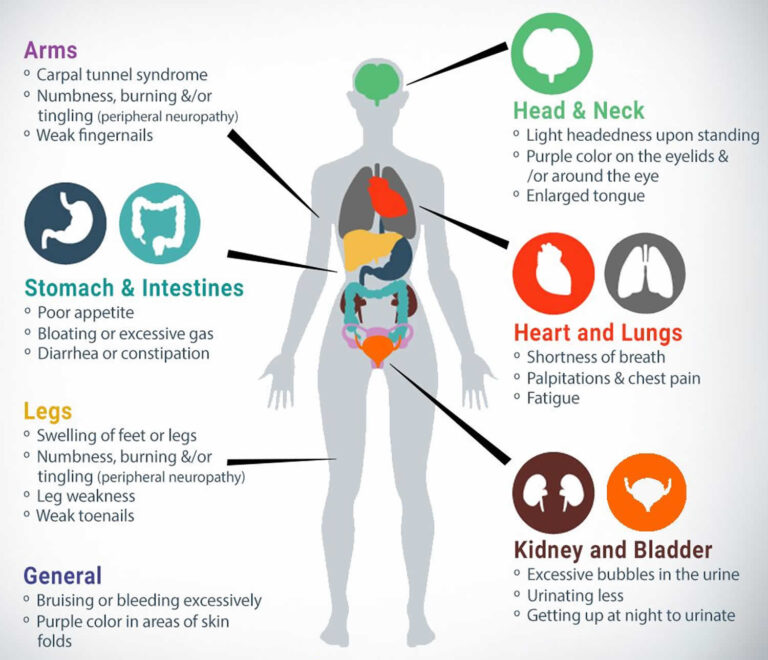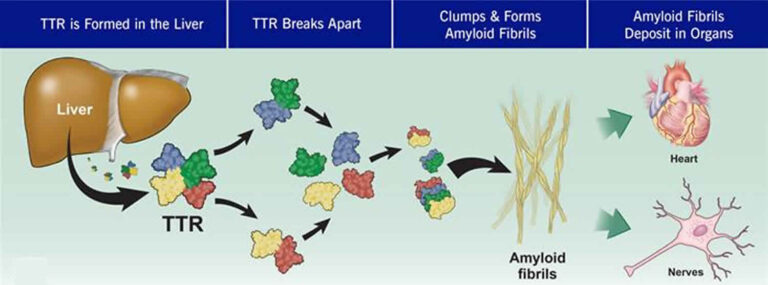AMYLOIDOSIS: A RARE DISEASE
Protein is the building block of the human body. But when protein gets built up in our tissues and organs leads to severe pain. The abnormal deposition of protein is clinically referred to as amyloidosis. The abnormal protein or amyloid fibrils get to build up in your tissues and organs leading to life-threatening organ failure. Amyloidosis affects the shape and functionality of the affected organs as well as tissues.

Amyloid normally is not found in the body but is formed from various types of protein. Various organs may be affected such as the heart, kidneys, liver, spleen, nervous system, and digestive tract. A few varieties of amyloidosis occur in association with other diseases that can improve as the doctors treat the underlying disease.
Although, amyloidosis is not a type of cancer it may be linked with certain blood cancers like multiple myeloma. Sometimes, its treatment may include chemotherapy that is similar to that used to combat cancer.
WHAT IS THE CAUSE OF AMYLOIDOSIS?
Amyloidosis can be caused by different factors including hereditary factors. Others can be caused by outside factors, such as inflammatory diseases or long-term dialysis. Many types of amyloidosis affect only a single organ or tissue in the body but in severe cases, it can even lead to multiple organ failures.
Different types of amyloidosis include:
- AL amyloidosis or immunoglobulin light chain amyloidosis: This is also known as primary amyloidosis that is most common in developed countries. The organs affected under primary amyloidosis are the heart, kidneys, liver, and nerves.
- AA amyloidosis: This is the secondary amyloidosis that is usually triggered by an inflammatory disease, such as rheumatoid arthritis, and affects mainly the kidneys, liver, and spleen. Advanced treatments of severe inflammatory conditions have resulted in a sharp decline in the number of cases of AA amyloidosis in developed countries.
- Hereditary amyloidosis (familial amyloidosis): This type of amyloidosis is an inherited disorder that affects the nerves, heart, and kidneys. It most commonly occurs when a protein produced by your liver is abnormal and is referred to as transthyretin (TTR).
- Wild-type amyloidosis: This is also known as senile systemic amyloidosis. This occurs when there is an abnormally high amount of the TTR protein produced by the liver due to unknown reasons. This wild-type of amyloidosis usually affects men over age 70 and usually targets the heart. It can also lead to carpal tunnel syndrome.
- Localized amyloidosis: This type of amyloidosis often affects multiple organ systems including the bladder, skin, throat, or lungs.

Some of the factors that increase your risk of amyloidosis include:
- Age: Most people between ages 60 and 70 are at a high risk of developing amyloidosis.
- Sex: Men are more prone to be affected with amyloidosis than women.
- Other diseases: Your risk of developing AA amyloidosis is high if you have a chronic infectious or inflammatory disease.
- Family history: Some types of amyloidosis familial amyloidosis are hereditary.
- Kidney dialysis: Dialysis of the kidney is not able to remove large proteins from the blood. For people on dialysis, abnormal proteins can build up in your blood and eventually be deposited in tissue.
- Race: It has been observed that people of African descent are at higher risk. This may be due to a genetic mutation associated with a type of amyloidosis that can harm the heart.
HOW TO IDENTIFY AMYLOIDOSIS?
Initially, some people may not experience signs and symptoms of amyloidosis. But, the signs and symptoms are evident as the condition advances. The signs and symptoms are depended on the organs that are affected.
Signs and symptoms of amyloidosis may include:
- Joints Pain.
- Change in skin color.
- Numbness, tingling or pain in your hands or feet,
- Pain in your wrist along with carpal tunnel syndrome.
- Swelling of your ankles and legs.
- Swelling of the tongue.
- Severe fatigue and weakness.
- Shortness of breath even with minimal exertion.
- Unable to lie flat in bed due to shortness of breath.
- Diarrhea, possibly with blood, or constipation.
- Unintentional weight loss is usually more than 10 pounds.
- Enlargement of the tongue, which sometimes looks rippled around its edge.
- Thickening or easy bruising, and purplish patches around the eyes.
- An irregular heartbeat.
- Difficulty swallowing.

The complications of amyloidosis depend on the affected organs that include serious damage such as:
- Heart: Amyloid deposition reduces the heart’s ability to fill with blood between heartbeats. Amyloidosis may affect your heart’s electrical system and cause disturbed heart rhythm, which makes it a life-threatening condition.
- Kidneys: Amyloid deposition can harm the filtering system of kidneys’ that causes the protein to leak from your blood into your urine. The patient may eventually need dialysis as this reduces the ability to remove waste products from your body. This may even lead to kidney failure.
- Nervous system: Due to amyloid deposition you experience pain, numbness or tingling of your fingers or numbness, lack of feeling, or a burning sensation in your toes or the soles of your feet. Amyloidosis may also affect the nerves controlling your bowel function causing bouts of constipation and diarrhea. Sometimes, it affects the nerves that control blood pressure that may make you faint after standing up too quickly.
HOW TO DIAGNOSE AMYLOIDOSIS?
The symptoms of amyloidosis may be similar to various diseases thus, diagnostic testing for amyloidosis is important that may include:
- Tissue biopsy: The doctor would take a small sample of the affected tissue to check for amyloid deposits.
- Bone marrow biopsy: The doctor would usually take bone marrow from the pelvic bone to check for the presence of amyloid deposits.
- Blood and urine tests: Urine and blood tests help determine the affected organs or tissues due to amyloid deposition.

WHAT IS INVOLVED IN THE TREATMENT OF AMYLOIDOSIS?
Currently, there is no cure for amyloidosis, but the symptoms are treatable. The doctors would focus on the progression of the disease, decreasing symptoms, and improving the quality of life.
Some of the therapies to decrease amyloid protein development include:
- Chemotherapy: This uses various drugs to kill the abnormal blood cells that help form amyloids. Some of the medications for myeloma, which is cancer of the plasma cells, can also help treat amyloidosis. Some of the chemotherapy drugs include:
- Melphalan
- Bendamustine
- Cyclophosphamide
- Stem cell transplant: After destroying the abnormal cells producing amyloids with chemotherapy, stem cell transplants can help develop healthy bone marrow.
- Controlling underlying diseases: People suffering from AA amyloidosis require controlling the underlying inflammatory disease that led to the buildup of amyloids. As the doctor treats the underlying condition, such as rheumatoid arthritis, the patient may experience fewer symptoms of amyloidosis.

- Supportive treatment: People suffering from amyloidosis may also need treatment of complications or make changes in their diet as well as lifestyle to make managing the disease easier. Supportive treatment includes:
- Medications to control heart failure.
- Blood pressure medications.
- Dialysis to treat kidney damage.
- Nutritional support and guidance for digestive issues.
OUTLOOK
Amyloidosis can be life-threatening as it may affect your vital organs such as the heart or kidneys. Early diagnosis and treatment are the keys to survival. Some of the treatment options for amyloidosis may slow the development of abnormal proteins as well as the progression of the disease. This helps people manage their symptoms. Amyloidosis usually affects more than one organ, which makes it advantageous to work with a team of specialists to develop an individualized treatment plan.
If you or anyone you know is suffering from amyloidosis, our expert providers at Specialty Care Clinics will take care of your health and help you recover.
Call us on (469) 545-9983 to book an appointment with our specialists.
